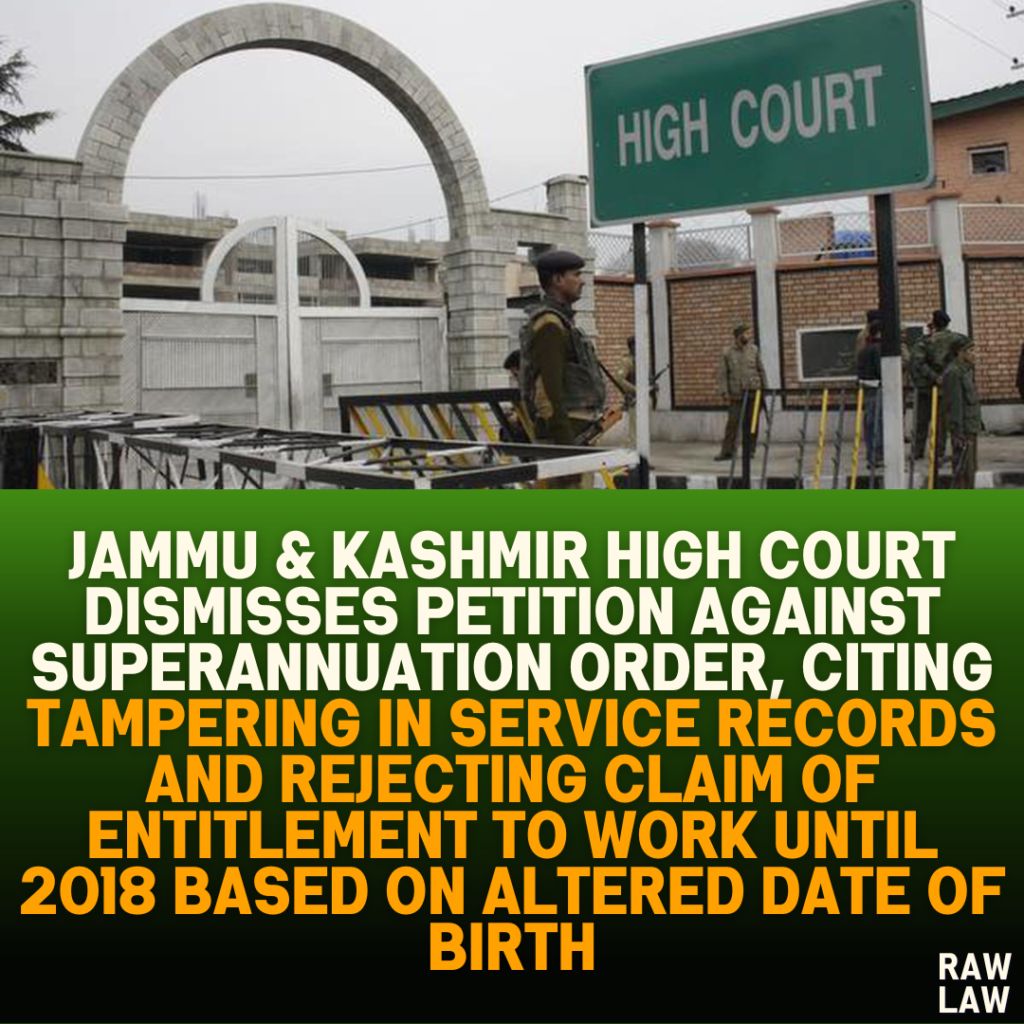Court’s Decision:
The Jammu & Kashmir High Court dismissed the petitioner’s challenge to his superannuation order. The court upheld the decision of the respondent department to retire the petitioner effective October 31, 2013, based on his official date of birth as October 20, 1955. The court found that there was tampering in the petitioner’s service records and rejected his claim that he was entitled to work until 2018 based on a different date of birth.
Facts:
The petitioner challenged an order issued in 2015, which deemed him to have retired on October 31, 2013. The petitioner argued that his actual date of birth was October 20, 1958, based on school records and sought a direction for the release of his salary until 2018, when he would have reached the age of superannuation based on this date.
According to the petitioner, his date of birth had been accepted as October 20, 1958, throughout his service, and it was not until 2015 that the respondent department challenged this by issuing an order based on a 1955 birth date. He claimed this action was taken without affording him an opportunity to be heard, which violated the principles of natural justice.
The respondents, however, maintained that the correct date of birth was October 20, 1955, as originally recorded in several official documents, including the petitioner’s Provident Fund application. They alleged that the date of birth in the petitioner’s service book had been tampered with, and the petitioner was responsible for the discrepancy.
Issues:
- Whether the petitioner’s superannuation based on the date of birth as October 20, 1955, was valid.
- Whether the respondent’s failure to provide the petitioner an opportunity to be heard before the superannuation order violated principles of natural justice.
- Whether the petitioner’s claim regarding the alteration of his date of birth to 1958 was legally sustainable.
Petitioner’s Arguments:
The petitioner contended that his date of birth had consistently been recognized as October 20, 1958, based on school records. He argued that the respondent department’s sudden decision to retire him early was arbitrary and illegal. Furthermore, he claimed that the retirement order violated principles of natural justice because no prior hearing was conducted.
Respondent’s Arguments:
The respondents argued that the petitioner’s date of birth was originally recorded as October 20, 1955, in official records, including his Provident Fund application, and this had been tampered with in the petitioner’s service book. They submitted that the superannuation order was based on the correct date of birth, and no hearing was necessary since the petitioner had admitted to the tampering and agreed to abide by the findings of the enquiry.
Analysis of the Law:
The court reviewed the legal requirement for a hearing in cases of superannuation and found that where there is clear evidence of tampering, as admitted by the petitioner, a prior hearing was not necessary. The petitioner had already filed an affidavit acknowledging the tampering and agreeing to accept the department’s decision.
Precedent Analysis:
The court did not refer to any specific precedents but relied on the principles of administrative law, particularly relating to superannuation and the principles of natural justice.
Court’s Reasoning:
The court emphasized that the petitioner’s service book showed clear signs of tampering, and this tampering was admitted by the petitioner. Moreover, the petitioner’s original records consistently reflected his date of birth as October 20, 1955. Given these facts, the court concluded that the superannuation order was valid and not in violation of natural justice principles. The court found no merit in the petitioner’s reliance on a school certificate issued after his retirement, which allegedly recorded his birth date as October 20, 1958. This certificate was deemed suspicious due to corrections in the school records and the petitioner’s age being below the permissible limit at the time of his appointment.
Conclusion:
The court dismissed the petition, upholding the petitioner’s superannuation with effect from October 31, 2013, based on the correct date of birth, October 20, 1955. However, it directed the respondents to release the petitioner’s retiral benefits and pay him his full salary for the period he actually worked, despite the deemed superannuation date.
Implications:
The ruling underscores the importance of accurate service records and the need for employees to maintain transparency in official documentation. The decision reaffirms that tampering with service records can lead to significant legal consequences, including premature retirement. The case also highlights the limited scope of the principles of natural justice in situations where a petitioner has admitted wrongdoing.
